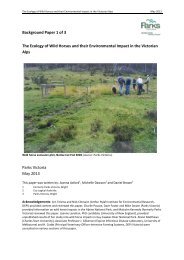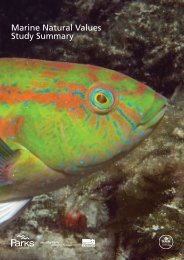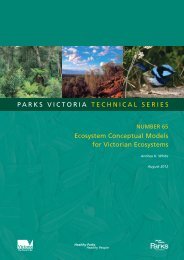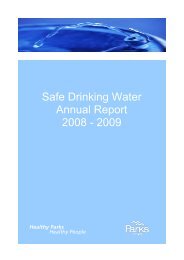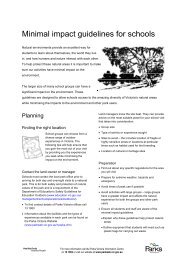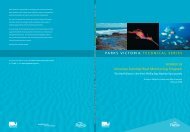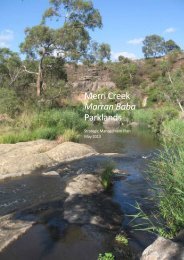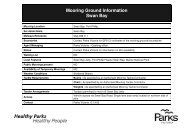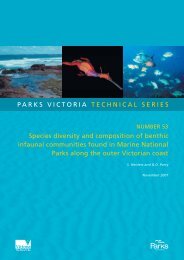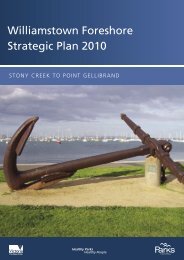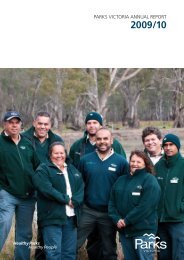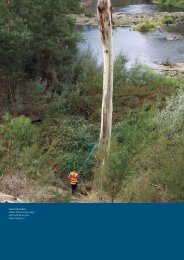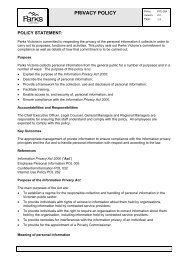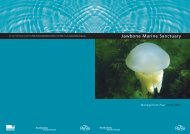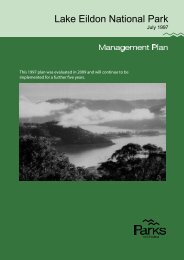parks victoria technical series marine natural values study vol 2 ...
parks victoria technical series marine natural values study vol 2 ...
parks victoria technical series marine natural values study vol 2 ...
You also want an ePaper? Increase the reach of your titles
YUMPU automatically turns print PDFs into web optimized ePapers that Google loves.
Parks Victoria Technical Series No. 79<br />
Flinders and Twofold Shelf Bioregions Marine Natural Values Study<br />
and has been confirmed from Discovery Bay MNP to near Cape Otway (DPI 2009). It is not<br />
in the Cape Howe MNP but its spread into the park could have serious long term ecological<br />
consequences for rocky reef communities (DPI 2009).<br />
Climate change represents a serious threat to <strong>marine</strong> ecosystems (McLeod et al. 2009) but<br />
specific ecological consequences of accelerating climate change are not well understood in<br />
<strong>marine</strong> systems, particularly in temperate systems. Climate change is predicted to increase<br />
water temperature, alter chemical composition (salinity, acidity and carbonate saturation),<br />
change circulation and productivity), increase frequencies of extreme weather events and<br />
exposure to damaging ultraviolet light (UVB), and increase air temperature, cloud cover and<br />
sea levels (conservatively 80 cm by 2100; CSIRO-BoM 2007; Fine and Franklin 2007; VCC<br />
2008; McLeod et al. 2009). A combined increase in cloud cover and sea level could result in<br />
decreased light availability potentially changing benthic flora. Increased storm surges and<br />
ocean current changes also have the potential to change the distribution of fauna and flora<br />
and could result in loss of habitats (CSIRO-BoM 2007). Intertidal communities will face<br />
increased desiccation, storm wave exposure and habitat shift. Changes in the relationship<br />
between climate and annual life-history events may force major change in functional groups<br />
and consequent ecosystem function (Fine and Franklin 2007). Climate change is also<br />
anticipated to modify species recruitment and habitat connectivity, species interactions and<br />
disturbance regimes in the <strong>marine</strong> environment (CSIRO-BoM 2007; Fine and Franklin 2007).<br />
A large number of species are at the eastern or northern limit of their distributional range at<br />
Cape Howe and such species would be particularly vulnerable to climate change. In<br />
contrast, the urchin Centrostephanus rodgersii, which is found in Cape Howe MNP, has<br />
increased its range down the east coast of Australia to Tasmania and that increase is<br />
thought to be linked to climate change with the EAC extending further south (Banks et al.<br />
2010).<br />
Measures to address or minimise these hazards form part of the management plan for Cape<br />
Howe MNP (Parks Victoria 2006c). For example research is being conducted into <strong>marine</strong><br />
pest species which may impact on park <strong>values</strong>, and options are being trialled for improving<br />
management of illegal activities in the MNP. Management actions have been implemented to<br />
minimise <strong>marine</strong> pest species and illegal fishing (Parks Victoria 2006c). Parks Victoria has<br />
also undertaken a strategic climate change risk assessment to identify the risks and<br />
stressors to <strong>natural</strong> <strong>values</strong> in the MPAs through assessment at the habitat level for <strong>parks</strong> in<br />
each <strong>marine</strong> bioregion. Parks Victoria will use an adaptive management approach to<br />
develop responses and actions that focus on priority climate change issues such as extreme<br />
weather events and existing risks that will likely be exacerbated by climate change.<br />
2.4.6 CURRENT RESEARCH AND MONITORING<br />
Parks Victoria has established extensive <strong>marine</strong> monitoring and research programs for the<br />
MPAs that address important management challenges, focussing both on improving<br />
baseline knowledge of the MPAs as well as applied management questions not being<br />
addressed by others. This knowledge will continue to enhance Parks Victoria’s capacity to<br />
implement evidence-based management through addressing critical knowledge gaps. The<br />
research and monitoring programs have been guided by the research themes outlined as<br />
part of Parks Victoria’s Research Partners Panel (RPP) program, a Marine Research and<br />
Monitoring Strategy 2007-2012 and Marine National Park and Marine Sanctuary Monitoring<br />
Plan 2007-2012 (Power and Boxshall 2007). Much of the research has been undertaken as<br />
part of the RPP program in<strong>vol</strong>ving collaboration with various research institutions. The<br />
research relevant to Cape Howe MNP has been published in Parks Victoria’s Technical<br />
Series available on Parks Victoria’s website (http://www.parkweb.vic.gov.au). As most<br />
research in the MNP has been carried out under permits issued by DSE, the permit<br />
86



